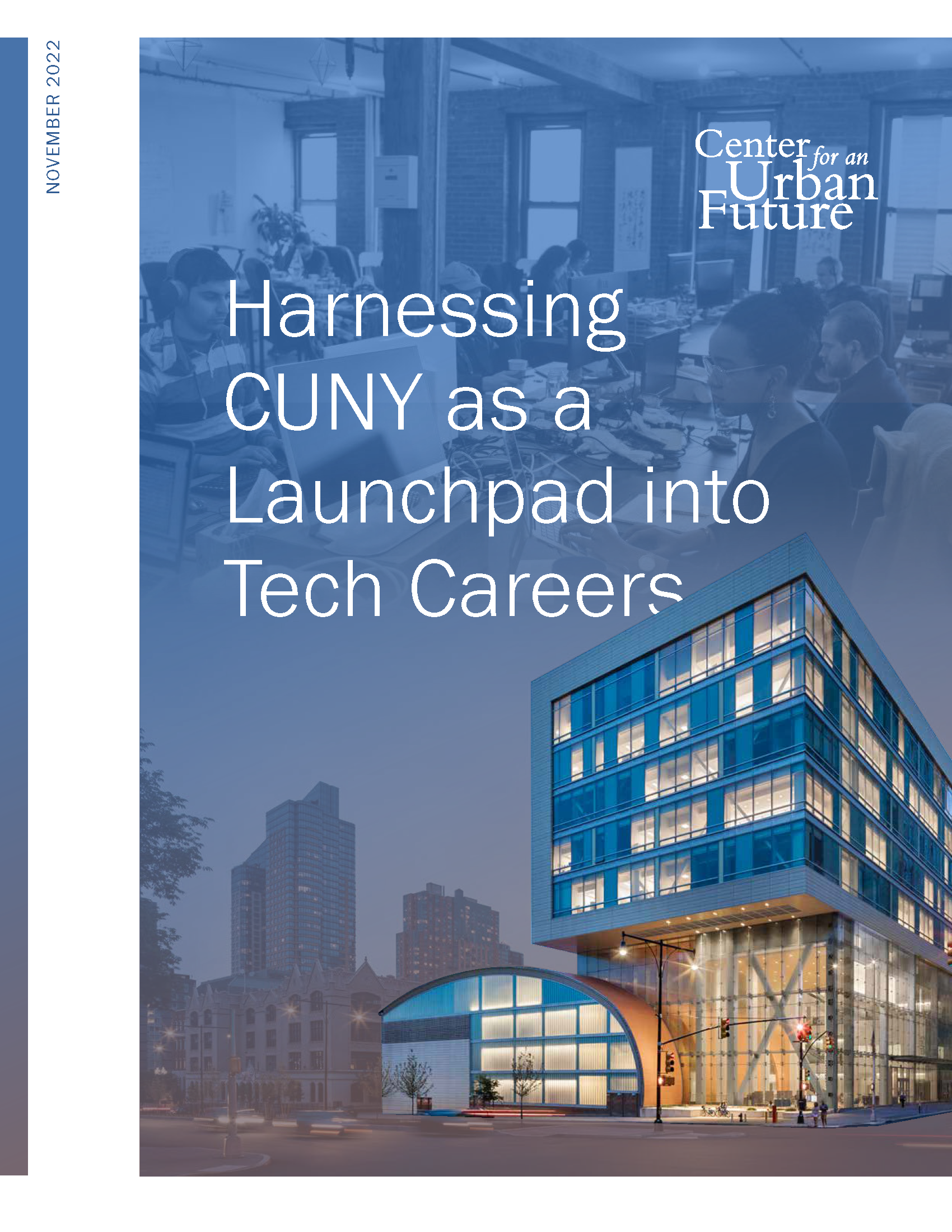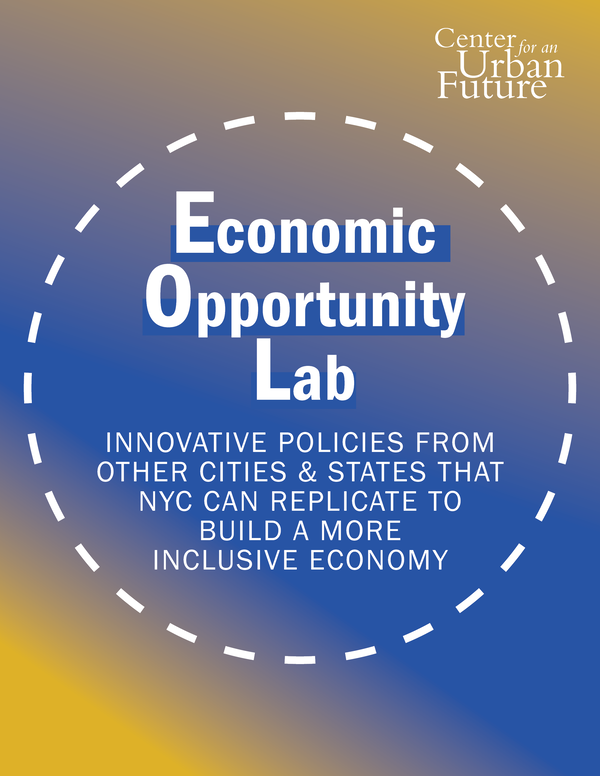In recent years, New York City and state leaders have worked with the City University of New York (CUNY) to help boost the number of New Yorkers from lower-income backgrounds who succeed in earning college degrees. These achievements are vital for ensuring that far more New Yorkers get on the path to well-paying careers at a time when accessible industries have shed employment, even as well-paying jobs that typically require bachelor’s degrees continue to grow.
But further progress will only be possible through a significant expansion of supports for CUNY’s 41,000 undergraduate adult learners, too many of whom are falling behind on the path to a degree.
Today, nearly one-quarter (23 percent) of all degree-seeking undergraduate students at CUNY are adult learners—students over the age of 25. These students are juggling an outsized share of family and work responsibilities compared to the traditional 18-year-old freshman. They are much more likely to be among the 31 percent of all working CUNY students who have full-time jobs, and among the 13 percent of all students who are financially supporting children—including one in six community college students.1 And adult learners at CUNY are more likely to be Black and/or women than are students under 25.
Adult learners bring many strengths with them to college. As a result, some adult learners at CUNY do very well; more than 13,900 students over 25 earned undergraduate degrees in 2023. But too many never get to the college finish line. The majority of CUNY students over the age of 25 are transfer students who have already earned some college credits. But just 51.1 percent of them earn a bachelor’s degree in six years. In contrast, 65.3 percent of CUNY transfer students under 25 earn a bachelor’s degree in the same period. Both part-time and full-time adult learners have lower bachelor’s degree success rates than younger students, and age-related gaps exist for all races and genders for which data is available.2
Helping more adult learners succeed at CUNY will require addressing a handful of unique barriers these older students face. First, few CUNY colleges currently offer enough flexible online, night, and weekend scheduling options to meet the needs of working students. Likewise, while on-campus childcare provides a key support for many adult learners, less than half of the current centers are open after 6 p.m., limiting access for many student-parents who are also working jobs during the day, and most are at capacity, with waiting lists of up to 30 student-parents each.3 Many adult learners struggle to access financial aid, because they used up the limited dollars they were eligible for during a previous period of enrollment, while others are working just enough to exceed income caps of as little as $30,000 per year for single, working adults.
CUNY has taken crucial steps to better support this population, from granting academic credit for previous work or life experiences to expanding access to on-campus childcare. But CUNY will need more city and state support to scale up the programs that are working and tackle persistent challenges, from relief from unpaid student balances to additional advising services.4 Moreover, CUNY’s nation-leading college success initiatives, such as Accelerated Study in Associate Programs (ASAP) and Accelerate, Complete, Engage (ACE), are more than doubling graduation rates. But these programs are reserved for full-time students, leaving behind the majority of CUNY’s adult learners—55.4 percent of whom attend on a part-time basis.5 Beyond CUNY’s own programs, New York City is home to several effective nonprofits focused on supporting college success; however, most work with students directly from high school into college and funding from the city and philanthropy largely targets students under 25.
CUNY is already among the nation’s most effective generators of economic mobility, but too few of today’s adult learners are able to realize this potential. By stepping up support for working adult students at CUNY, policymakers can ensure that thousands more New Yorkers are able to earn college credentials and achieve success in New York’s fast-changing economy.
This report shines a spotlight on CUNY’S adult learners, and analyzes what more will be needed— from Mayor Eric Adams and other city policymakers, from Governor Kathy Hochul and other state leaders, and from CUNY itself—to get more of these students across the college finish line. Supported by a grant from the Deutsche Bank Americas Foundation, this study builds on decades of CUF research around increasing college attainment for lower-income New Yorkers. The study was informed by extensive data analysis and interviews with more than 60 CUNY officials and staff, leaders of nonprofits focused on college and career success, adult learner and higher education experts, and current and former adult learners in CUNY’s degree-granting programs.
As of the fall 2023 semester, there were 41,388 degree-seeking undergraduate students over 25 at CUNY, which is more than all undergraduates at New York University and Columbia University combined.6 Adult learners now account for nearly a quarter (23.2 percent) of all CUNY students, and the share is even higher at the city’s community colleges, where students 25 and over make up 29.3 percent of the student population, up from 28.2 percent a decade ago.
Even as overall enrollment has declined at CUNY over the past decade, the number of older students has held relatively steady. As a result, adult learners now comprise a growing share of all undergraduates at 5 out of 7 community colleges: Kingsborough Community College (from 26.4 percent in 2013 to 30.6 percent in 2023); Hostos Community College (from 36.8 percent to 41.4 percent); Queensborough Community College (from 21.3 percent to 24.1 percent); Borough of Manhattan Community College (BMCC) (from 24.6 percent to 25.3 percent); and Guttman Community College (from 1.6 percent to 4.8 percent). Adult learners comprise over one-third of the undergraduate population at seven colleges, including Hostos (41.4 percent); Medgar Evers College (38.5 percent) Lehman College (34 percent); LaGuardia (33.1 percent); Bronx Community College (34.5 percent), as well as the CUNY School of Professional Studies (82 percent) and the CUNY School of Labor and Urban Studies (83.5 percent).7
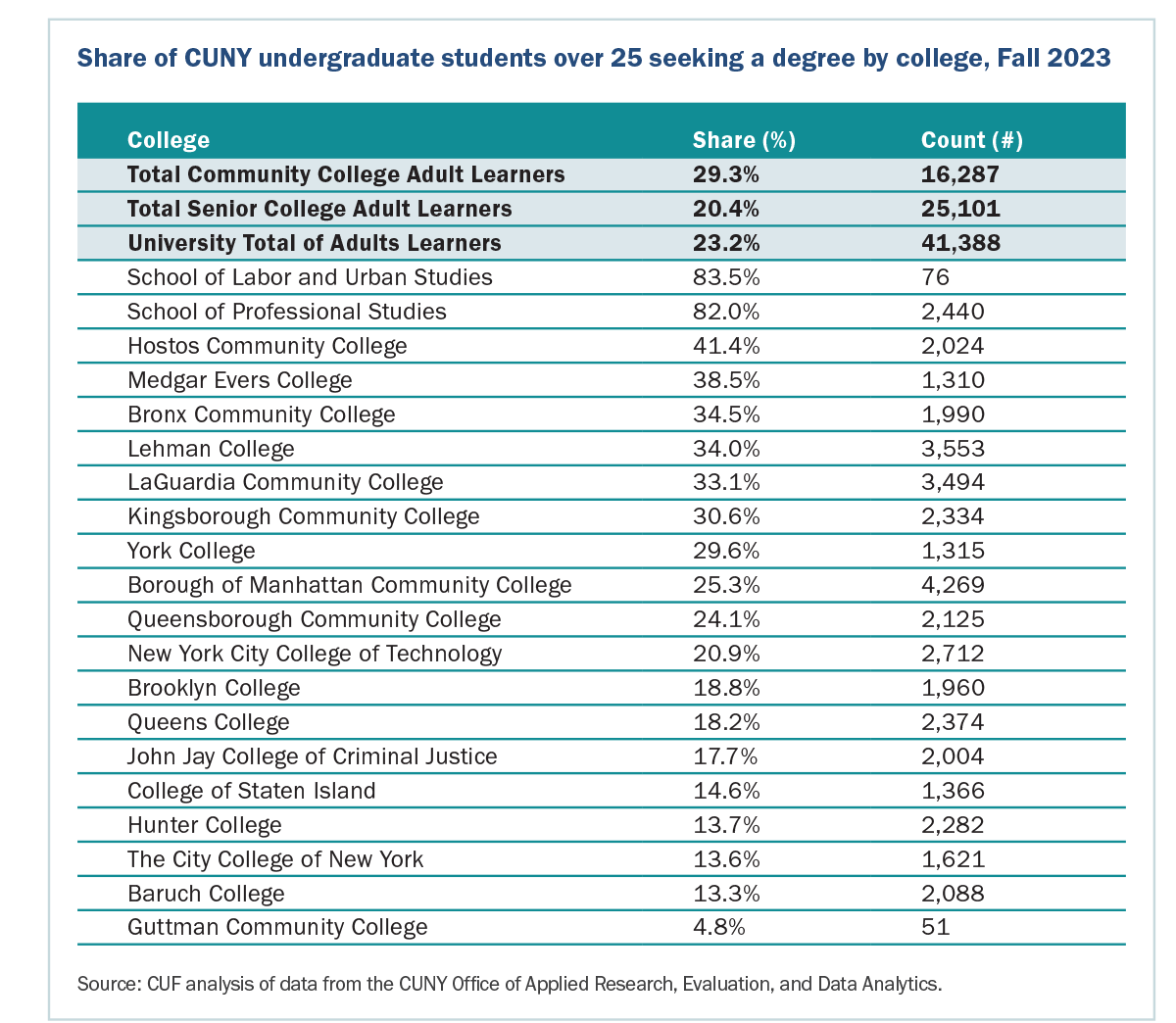
CUNY has taken action in recent years to step up support for its large and growing population of adult learners. With additional support from government, CUNY can help significantly more adult learners succeed and make further progress toward a more inclusive economy.
Getting there will require city and state policymakers to address a number of barriers that adult learners encounter on the path to a college credential. Indeed, experts who work closely with first-generation college students at CUNY say that adult learners cope with unique challenges above and beyond those faced by other lower-income students. For instance, adult learners are typically working and supporting family members, while coping without the networks of support that more traditional students benefit from when navigating college.
“It’s harder to get a degree as an adult learner,” says Danae McLeod, CEO of Grace Institute of New York, a workforce development organization for lowincome women. “And without a degree it’s harder to move into a higher income bracket.”
Retention and graduation rates for many of CUNY’s adult learners are lower than for under-25 peers.
While adult learners make up a significant share of students at CUNY and a growing share of the population at its community colleges, they often struggle to complete credentials when compared to their under-25 peers. A key factor driving lower graduation rates for adult learners is that they are significantly less likely to persist from their first year to their second year of college.
Overall, CUNY retains just 37.3 percent of transfer students over 25 who are enrolled in bachelor’s degree programs from year one to year two, compared to 49.8 percent of transfer students under 25.
This retention challenge is an unfortunate reality when so many adult learners—even more than a traditional student under 25—are just a single unexpected bill, job loss, family crisis, or new child away from having to choose between college, work, and family.
“We have a much higher retention rate than most, but we still lose a bit over 40 percent of our students who never graduate,” says Jorge Silva-Puras, speaking when he was interim dean of the CUNY School of Professional Studies, where 84.3 percent of undergraduate students are over 25. “And when we do exit interviews, the primary reason is because of financial needs.” Silva-Puras is now provost at Lehman College.
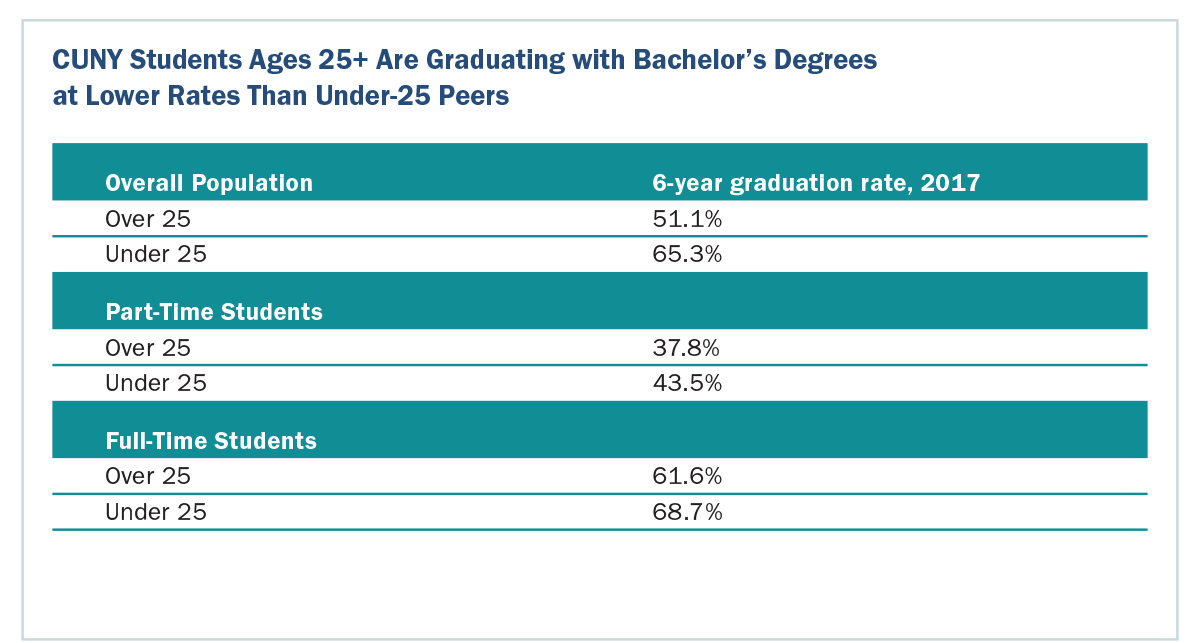
Many of the financial challenges faced by adult learners are also experienced by other CUNY students. Nearly 40 percent of all CUNY students come from households that earned less than $20,000 last year. Half of all students work while enrolled, of whom nearly one-third are working full-time. And about 40 percent of all students have experienced food and/or housing insecurity in the past twelve months.8 These financial challenges are compounded by a mix of work and family responsibilities and policies that fall short of meeting the needs of working students, making a college degree especially challenging for many adult learners to obtain.
Although CUNY has taken several important steps to better support adult learners in recent years, including significant efforts to expand access to wraparound services, boost on-campus childcare, and provide credit for prior learning (CPL), much more is needed to support adult learners in their pursuit of higher education. Adult learners often find that the college-going experience is still tailored to the 18-year-old first-time freshman, while some working adults are dissuaded from pursuing a college degree in the first place.
“Too often, CUNY doesn’t seem like a welcoming place to 25- and 26-year-olds, ” says Stephanie Fiorelli, speaking when she was director of postsecondary readiness and success at the Urban Assembly, a nonprofit that promotes economic and social mobility by improving public education. She is now director of programs at the Eagle Academy Foundation. “And if you don’t feel wanted, why would you even go to begin with?”
This report identifies five key challenges that prevent too many of CUNY’s adult learners from earning degrees, including:
1. Limited and inconsistent flexible scheduling options prevent adult learners from progressing toward degrees. Adult learners need required classes that can fit into their busy schedules, whether at night, on the weekends, or online. If courses that are required to complete majors are mainly offered from 9 a.m. to 5 p.m., then adult learners who work or care for family members during those times will be unable to earn credits toward their degrees, with some choosing to drop out as a result. Our research suggests that there are not enough flexible scheduling options at CUNY; scheduling varies widely by college and major, with only a small number of required classes available at night, on the weekends, or online for any given major.
Data from surveys of CUNY students suggest that challenges with scheduling classes are a significant factor limiting students’ academic progress. Among students who were unable to register for a course, 32 percent said it was because the course was only offered in-person but they wanted to take it online. Fully 39 percent want more courses in the evenings, and 34 percent want more courses on the weekends.9 CUNY does have a few initiatives dedicated to increasing flexible scheduling options, including its recent CUNY Online initiative, but the university will need additional resources and more department-level buy-in to provide a robust menu of flexible class options across all colleges and programs.
2. Childcare centers at CUNY need additional hours, capacity, and awareness to support the needs of adult learners who are parents. Fully 13 percent of CUNY students are parents, and a disproportionate share of them are over the age of 25, according to interviews we conducted with directors of CUNY’s childcare centers.10 These publicly funded childcare centers have been hugely helpful, offerings low-cost or free childcare while students are attending classes or studying. However, most operate with limited hours and space. Without widely accessible childcare, many adult learners are unable to enroll in certain required classes, or fit night and weekend classes around their busy schedules.
Several childcare centers surveyed by the Center for an Urban Future had waitlists in Spring 2023 ranging from 5 to 30 parents: City Tech had a waitlist of 5 to 10 parents; LaGuardia had a waitlist of 10 to 15; Brooklyn had a waitlist of 20, and Hostos had a waitlist of 30 parents. Our research also finds that only seven of the seventeen CUNY childcare centers are open during the week after 6 p.m. Just two of the seventeen centers are open on the weekends.11
“I know for my major, some of the classes are not available in the morning. They are afternoon classes from 6 p.m. to 8:30 p.m. or from 2 p.m. to 6 p.m. and the center only runs until five,” says Johana Sibri, an adult learner at City Tech studying mechanical engineering while taking care of her child. “I had to withdraw some of the classes because I couldn’t leave my son for a longer period in there.”
3. Adult learners who are working or previously attended college face major challenges accessing financial aid. New York State offers some of the nation’s most generous financial aid programs, including the Tuition Assistance Program (TAP) and the Excelsior Scholarship. Unfortunately, many of CUNY’s adult learners are not able to take advantage of this assistance. The problem is that many adult learners who are working make just enough to be disqualified from financial aid but too little to afford to pay for college out-of-pocket. Students are unable to access TAP if they live independently and earn more than $60,000 annually as a married couple with no tax dependents, or more than $30,000 if single—and these limits were only just raised from $40,000 and $10,000, respectively, in the FY 2025 New York state budget.12 Experts say that the previous limits prevented many adult learners from accessing financial aid. Going forward, state policymakers will have to assess whether the increased limits are still too low to support college-going among lower-income adult learners—for instance, the new limits are below what a single adult would earn working full-time at a minimum-wage job in New York City.
“There may be an adult learner who’s currently working and right at the threshold of earning financial aid,” says Theory Thompson, chief program officer for education and vocation programs at Good Shepherd Services, a social services nonprofit that supports college students. “It’s not enough to necessarily live off of and thrive. But it’s too much to qualify for financial aid. So how is this adult learner going to go back and get an education?”
Additionally, many adult learners used up TAP eligibility during a previous attempt at college and may have little, if any, dollars remaining after reenrolling.
The state’s Excelsior Scholarship, which provides tuition aid to students from households making up to $125,000, is likewise structured in a way that impedes access for many adult learners. Part-time students are ineligible—leaving out the majority of CUNY’s adult learners—and returning students are only eligible if they were taking a full-time courseload with no break in enrollment in the semesters before they returned to college. These requirements serve to prevent adult learners who were originally part-time students from receiving Excelsior when they return to college, and bars first-time adult college students who are enrolled part-time.
4. Unpaid balances prevent adult learners from reenrolling in college. In addition to the disproportionate challenges that adult learners face with scheduling required classes, managing childcare, and maintaining financial aid, many face a major obstacle to reenrolling in CUNY: unpaid balances. College administrators say that many of the students who drop out of CUNY each year leave owing the university money, often because other life and financial challenges led them to withdraw, or due to a loss of financial aid. Few of those students are in a position to settle their final bills after leaving college, or to pay off previous balances in order to reenroll. Experts say that even an unpaid balance as small as $100 can derail working adults with some college but no degree from returning or deter existing adult learners from returning for the next semester as they weigh whether to pay an overdue balance or an urgent bill such as rent or food.
“You cannot re-enroll unless you pay off the $250 from this class that you dropped after the period,” says Rochelle Sinclair, executive director of college success nonprofit OneGoal. “Some of that seems insignificant, but that’s an incredible burden for many of our New Yorkers in terms of making a decision about whether they’re going to persist in their post-secondary path.”
5. Without fully resourced advising offices, adult learners are more likely to stop out. Advisors are essential navigators for helping adult learners complete their credentials; if students do not have consistent access to an advisor, they can fall behind in their academic progress while remaining unaware of vital supports that can help offset costs. However, the typical academic advisor at CUNY has a caseload in the hundreds, seriously curtailing the time they can spend with students. According to interviews with college administrators, the ratio of students to advisors is upward of 900 to 1 at most senior colleges and roughly 400 or 500 to 1 at most community colleges. Experts say that adult learners in particular benefit when they have close advising relationships, which can make the difference for students struggling to balance tuition payments, nontuition costs like books and technology, work responsibilities, childcare, and more. But fully 51 percent of CUNY students say that they haven’t met with an academic advisor, underscoring the challenge of reaching the students who would benefit most from one-on-one advising amid such a persistent undersupply.13
This report also finds three key areas of opportunity where additional city and state support can help boost college success for more of CUNY’s adult learners, including:
1. Credit for prior learning is a powerful but underrealized tool at CUNY. Credit for prior learning is a valuable process whereby students can earn academic credit for college-level learning acquired outside of the traditional classroom—including industry training and credentials; military service; a portfolio assessment of past personal and work experiences; or by passing one of several dozen nationally recognized exams that assess non-classroom learning. Credit for prior learning can help adult learners save considerable time and money on their college path; a major 2020 study found that students who received prior learning assessments graduated at nearly double the rates of students who did not participate in CPL; students at 2-year and 4-year public institutions saved from $1,500 to almost $3,800.14
In 2020, CUNY approved a university-wide credit for prior learning policy, a major step forward in supporting college completion for adult learners. However, CPL implementation remains spotty across colleges; only half of CUNY’s senior colleges and a little more than half of all community colleges offer CPL currently.15 College administrators and CPL experts say that several challenges persist at CUNY, including generating buy-in from faculty who are resistant to the idea of applying prior learning toward degree requirements; establishing requirements that departments offer credit to students who pass challenge exams or portfolio reviews; standardizing credit awards for specific forms of prior learning across departments and colleges; and approving credentials and certifications obtained outside CUNY as eligible for credit toward degrees.
2. Expanding or replicating college success programs to serve part-time students can better support CUNY’s adult learners. Several important CUNY programs, supported by city, state, and philanthropic funding, provide students with evidence-backed academic and wraparound supports that have proven to increase graduation rates. The nationally recognized CUNY ASAP initiative, for instance, now reaches nearly 25,000 community college students each year, and participating students have posted graduation rates more than double those of peer non-ASAP students.16 But programs like ASAP, ACE, and College Discovery require full-time study, leaving out the majority of adult learners who are part-time students. As a result, approximately 82 percent of ASAP participants were 22 or younger from 2007 to 2019.17 If city and state leaders were to help CUNY launch a program like ASAP for part-time students, more adult learners could receive essential wraparound supports to help them succeed in college.
3. Community-based nonprofits are instrumental in boosting college success, but need support to serve more students over 25. Thousands of CUNY students benefit from relationships with nonprofit community-based organizations that have the trust and experience needed to support them in the pursuit of a degree. However, our research suggests that the vast majority of the students served by these programs—an estimated 90 percent or more—are under the age of 25. One leading nonprofit, Good Shepherd Services, reports that its college support programming typically serves students 17 to 21; the college success nonprofit OneGoal reports typically serving students 15 to 19; the Urban Assembly works with high school students and alumni up to two years post-graduation.
Representatives from these organizations say they would not turn away students over 25, but their models focus on a younger demographic. One roadblock to working with older students is that there is no clear pipeline: many community-based organizations have worked with students from high school into college. Another major hurdle is securing government and private funding to serve students over 25. Several nonprofit leaders say that the city contracts and philanthropic grants that support their college success work either specifically focus on students in their teens through ages 21 to 24, or have never included funding tied to supporting the adult learner population.
“To my knowledge, there is no specific funding to target that older population interested in 8 going to college,” says Theory Thompson of Good Shepherd Services. Nonprofit leaders add that key funding streams allocated by city agencies to support college access and success programs are expressly limited to students under 25. “A lot of the funding that the city distributes is for young adults, and that means it can only go toward services for 17- to 24-year-olds,” says Danae McLeod of Grace Institute.
Strengthening Pathways to College Success for Adult Learners at CUNY
The city and state have helped CUNY make important strides to boost graduation rates—enabling thousands more New Yorkers, mostly from low-income backgrounds, to complete a credential and broaden their career opportunities. But more is needed to help CUNY’s 41,000 undergraduate adult learners earn degrees at rates comparable to younger learners, while boosting support for working students juggling a myriad of responsibilities beyond college.
At the same time, New York City is in the process of helping tens of thousands of additional adult learners with some college credits but no degree to return to CUNY through the groundbreaking CUNY Reconnect initiative. Yet without additional efforts to tackle the barriers to a degree that disproportionately derail adult learners, the impact of that program may not reach its full potential.
To strengthen CUNY’s vital role as an engine of economic mobility, New York City and State leaders will need to work closely with CUNY on investments, programs, and initiatives that support adult learner success.
“It feels like a no-brainer to invest in adults who want to pursue degrees,” says Shalema Henderson, senior director of the College Allies program at CARA, a nonprofit focused on helping low-income students succeed in college. “By getting more people degrees, their communities and their kids and generations beyond will benefit.”
There’s a lot that city and state leaders should do to help more of CUNY’s adult learners succeed in earning college degrees. Most urgently, policymakers should focus on reducing the financial barriers that disproportionately limit the ability of adult learners to pursue and achieve college credentials. Specifically, New York State should raise the income threshold requirements for TAP and eliminate the requirement for successive semesters of study to qualify for the Excelsior Scholarship, expanding access to crucial financial aid for thousands more adult learners. The city and state should also work with CUNY to launch a CUNY Fresh Start initiative to resolve unpaid balances up to $1,000 if a student has not been enrolled for more than two semesters, allowing adult learners to come back to college.
To scale up promising but limited efforts to provide credit for prior learning to more working-age New Yorkers, the New York State Education Department should develop a Credit for Prior Learning Review Board that can accelerate the adoption of outside certifications, credentials, and work experience that can count as credit toward a degree, reducing the administrative burden on CUNY.
Going forward, Mayor Adams and the City Council should pilot a wraparound support program specifically designed for part-time adult learners—call it CUNY Flex—that would extend crucial supports like hands-on advising, free MetroCards, and technology to parttime, working students who are ineligible for the highly effective CUNY ASAP and ACE programs. As part of this approach, the city should partner with nonprofit college success organizations to support adult learners by launching the NYC Adult Learners Network, providing competitive grants for community-based organizations to support college success for students ages 25-plus.
At a time when adult learners are comprising a growing share of all students at CUNY’s community college and nontraditional learners are becoming the new normal, city and state leaders should step up support for CUNY’s adult learners, invest in the services and supports that can help far more adult learners earn college degrees, and ensure that thousands of working New Yorkers are able to earn the credentials needed to thrive in New York City’s economy.
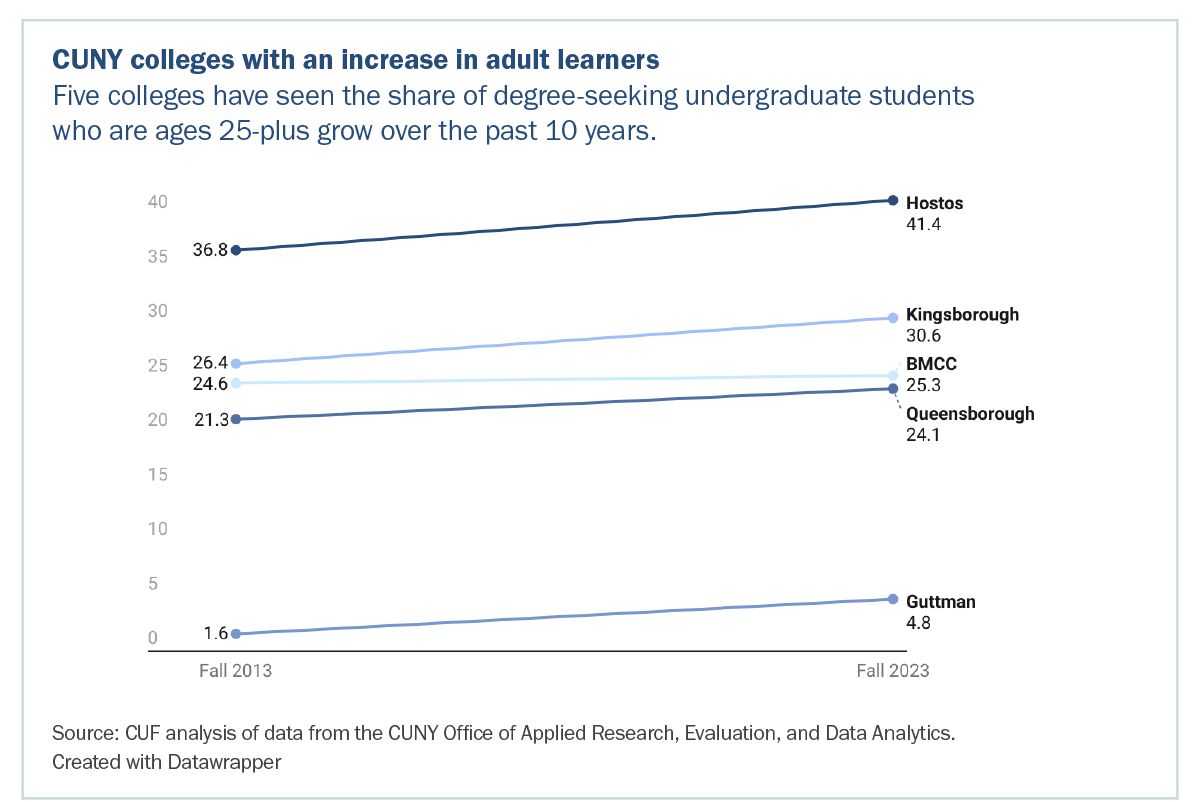
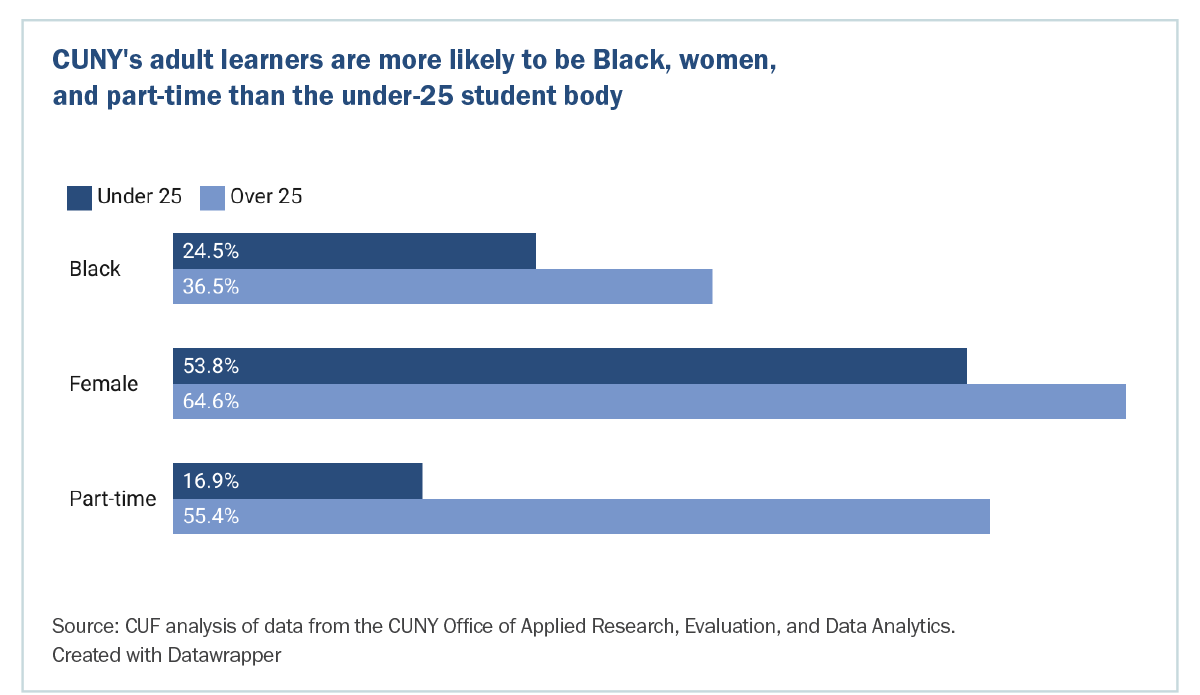
For Mayor Adams, the City Council, and CUNY
1. LAUNCH CUNY FLEX, A WRAPAROUND SUPPORT PROGRAM FOR PART-TIME STUDENTS, WITH A FOCUS ON ADULT LEARNERS. CUNY’s student success programs, including the nationally recognized CUNY ASAP, provide students with evidence-based wraparound supports that help them succeed at college, including a dedicated advisor, a free MetroCard, and money for textbooks. However, these programs require full-time enrollment, shutting out the majority of adult learners (55.4 percent) who study part-time. Mayor Adams and the City Council should help tackle this gap by launching a new wraparound services initiative for part-time learners—call it CUNY Flex—which would be designed to replicate the evidence-based supports of CUNY ASAP for part-time students, with a focus on returning students and other adult learners.
2. ACCELERATE THE CUNY ONLINE INITIATIVE TO ENSURE THAT FAR MORE COURSES AND DEGREES CAN BE COMPLETED ONLINE—AND EXPAND NIGHT AND WEEKEND OPTIONS FOR REQUIRED COURSES. For adult learners to fit college into their already-packed schedules, more flexible scheduling options are necessary, including increased availability of online, night, and weekend classes. However, the number of online, night, and weekend courses in each major varies widely from college to college at CUNY, preventing adult learners from registering in the classes required to complete their degrees. City leaders should help CUNY scale up its emerging CUNY Online initiative so that many more adult learners have the flexibility they need as they finish college, and CUNY leadership should work with each college to develop night and weekend options for required courses.
- Invest $8 million over the next four years to make CUNY a national leader in offering online and hybrid degree-granting programs. CUNY’s 2023-2030 strategic plan set a goal of expanding fully-online programs to almost 300 by 2030. The CUNY Online initiative also plans to expand hybrid (partly in-person, partly online) degree paths to give students more options in completing their credentials. To support and accelerate this goal, the city should invest $8 million over the next four years to help CUNY accelerate progress around online learning infrastructure, with the goal of becoming a national leader in online and hybrid learning.
- Train CUNY faculty on best practices for online and hybrid teaching. While the pandemic pushed universities, including CUNY, to go online, few faculty had the knowledge necessary to teach effectively in that format, even with the necessary technology. The city should invest in faculty training and professional development and create a network of online and hybrid learning ambassadors, enabling more CUNY faculty and adjuncts to gain proficiency in online learning and improve the online learning experience for their students.
For the City and State
3. LAUNCH THE NYC ADULT LEARNERS NETWORK WITH COMPETITIVE GRANTS FOR COMMUNITY-BASED ORGANIZATIONS TO SUPPORT COLLEGE SUCCESS FOR STUDENTS AGES 25-PLUS. New York City is home to several effective nonprofits that help students access and graduate from college by providing mentorship, college readiness workshops, tutoring, financial counseling, and other services. However, the vast majority of the students served through these programs are under the age of 25, either because their relationships with these CBOs started while in the K-12 system, or because existing sources of city and philanthropic funding focus on the 17-24 demographic. Policymakers can help harness the power of the city’s CBOs by launching the NYC Adult Learners Network, a new initiative that would provide competitive grants to nonprofits to support CUNY’s adult learners on the path to their degree, and create a community of practitioners dedicated to improving outcomes for adult learners.
4. CREATE A CUNY FRESH START INITIATIVE TO REDUCE OR ELIMINATE UNPAID BALANCES UP TO $1,000 FOR STUDENTS WITH SOME COLLEGE CREDITS BUT NO DEGREE, ALLOWING MORE ADULT LEARNERS TO RETURN TO COLLEGE. Many CUNY students who leave without a degree—often due to a financial or family challenge—end up owing the university money for an unpaid bill. These unpaid balances prevent students from reenrolling in CUNY, and can bar students from persisting across semesters. To help more adult learners return to CUNY and complete credentials, and boost persistence, the city and state should partner on a Fresh Start initiative that would clear an unpaid balance of up to $1,000 for CUNY students who started but have not completed their degree so that they can re-enroll and finish their credential.
5. EXPAND CHILDCARE SUPPORT FOR CUNY STUDENTS. Along with flexible scheduling, robust childcare is essential for adult learners to be able to study and attend class while raising children. New York City and State should combine resources to expand childcare offerings on campus by investing in 50 more childcare staff positions, including teachers and administrators, so that childcare centers can stay open for longer hours. They should also increase recurring operating dollars to support childcare programming. At the same time, CUNY should be integrated into Mayor Adams’s childcare expansion effort, with vouchers provided for students to use at group childcare centers near their homes or to compensate friends or relatives for providing childcare services.
6. ACCELERATE THE ADOPTION OF CREDIT FOR PRIOR LEARNING ACROSS ALL CUNY COLLEGES. Credit for prior learning is a huge boon to adult learners who have previous work experience and are returning to college—saving students time and money toward a degree, while incentivizing reenrollment. While CUNY has a university-wide CPL policy, adoption has varied significantly among colleges. The city should support CUNY in fully harnessing credit for prior learning at every CUNY campus.
- Require all departments to offer portfolio reviews and challenge exams as methods to evaluate credit for prior learning. While there are many methods of assessing credit for prior learning, two that could benefit adult learners the most are not currently required by the university. Portfolio reviews allow students to submit a record of past work and learning experiences, some outside of the traditional academic experience, that could count toward credit. The challenge exam similarly tests the competences of students alongside the learning objectives of a course to award credit. CUNY should require all departments to offer these options, so adult learners who have worked and have relevant skills and experiences can jumpstart their college credential.
- Expand agreements with leading nonprofit workforce development organizations so that New Yorkers who pursue career training can also accrue college credit. New York City is home to a vast landscape of workforce development organizations that give their participants the knowledge and experience to enter certain careers. Many adult learners who completed these training programs may also want to pursue a college degree, and already have the competences they would learn in some of their college courses. CUNY should partner with more nonprofit workforce development organizations, especially those aligned with growing and high-wage industries such as tech, health care, and the creative economy, so that students can earn college credits as they achieve career training goals.
- Scale up the three-credit portfolio review class currently offered by CUNY SPS to all CUNY campuses. The CUNY School of Professional Studies has systemized the credit review process by providing a credit-bearing course in which students can develop their portfolios and faculty can assess them for appropriate credits. CUNY should replicate this model across all of its campuses so that adult learners can more easily tap into their past work and learning experiences to make progress toward degrees.
7. HELP CUNY MARKET PART-TIME TAP TO REACH EVERY ELIGIBLE STUDENT. In 2024, Governor Hochul and the State Legislature passed a budget that formalizes the expansion of TAP to more part-time students—an important victory for the majority of adult learners who study part-time while juggling other responsibilities. While colleges are awarding TAP to more and more part-time students, colleges have noted that only a fraction of their part-time population have benefited, indicating that many students may not even be aware of the money available to them. City policymakers should help CUNY launch a major new marketing effort around TAP expansion, so that more part-time learners can learn about and receive the necessary financial aid to continue their education.
8. ESTABLISH A MAXIMUM RATIO OF 150 ADVISORS PER STUDENT ACROSS CUNY AND FUND FULL-TIME ADVISOR LINES AT EVERY COLLEGE TO ACHIEVE THIS. College advisors provide students with much-needed guidance on how to best complete their degree path, a service that is especially valuable for many adult learners who are attempting to earn a college degree while juggling a multitude of work and family responsibilities. Due to limited funding, CUNY’s advisor-to-student ratios are unacceptably high, ranging from 400 or 500 to 1 up to nearly 1,000 to 1, unless a student participates in a program such as CUNY ASAP, in which the ratio is a much more manageable 150 to 1. Mayor Adams and the City Council should prioritize investments that help lower the universitywide student-to-advisor ratio to 150 to 1, and fund additional full-time academic and career advisor lines.
For Governor Hochul and New York State
1. REFORM EXISTING TUITION ASSISTANCE PROGRAMS TO HELP MORE ADULT LEARNERS AFFORD COLLEGE. Financial aid is arguably the most crucial factor that determines whether an adult learner will persist and succeed in higher education. However, many adult learners cannot access the state’s Tuition Assistance Program (TAP) or the Excelsior Scholarship because these learners only just exceed the income threshold or fail to meet full-time enrollment requirements. At the same time, lower-income adult learners who live independently generally make too little to afford to pay for college out-of-pocket without this aid. The state can take several concrete steps to change this, and make college far more affordable for working adults.
Raise the income threshold for TAP eligibility. State policymakers took action in 2024 to increase TAP income eligibility guidelines—an important step toward greater inclusion of working adult students in financial aid. Going forward, policymakers should consider additional targeted increases for students who live independently. For instance, even after the recent increase, a New York City resident who makes minimum wage working full-time would be unable to qualify for TAP. New York State should raise the maximum income threshold for TAP to $80,000 for married students and $40,000 for single students so more working adult learners can receive aid.
Reform Excelsior Scholarship credit requirements to expand access to more students. New York State’s Excelsior Scholarship provides aid to students from households making up to $125,000, but eligibility requirements leave out many adult learners. For instance, students who previously attended college before applying for Excelsior must have been taking a full-time courseload each semester with no break in enrollment, and current students must be enrolled full-time. The state should amend these requirements to include part-time students so that the more than half of all adult learners who are enrolled part-time are able to access the Excelsior Scholarship.
2. LAUNCH NEW YORK’S FIRST COMPETENCY-BASED EDUCATION INNOVATION GRANT, MODELED ON OHIO’S SUCCESSFUL INITIATIVE. Competency-based education (CBE) is a flexible learning model that helps save students time and money toward a degree. Instead of sitting through a semester-long course, students can demonstrate existing knowledge of the material to accelerate through the class while taking other modules at their own pace. The structure of competency-based education suits the unique profile and needs of adult learners with busy schedules as well as prior learning experiences. New York State should launch its first Competency-Based Education Innovation Grant, modeled on a similar and successful effort in Ohio, to spark innovation around the development of CBE across the state.
3. HELP CUNY ACHIEVE ITS AMBITIOUS CREDIT FOR PRIOR LEARNING GOALS BY LAUNCHING A CPL REVIEW BOARD. While CUNY has its own university-wide credit for prior learning policy, a major step forward to help adult learners on their way to college completion, there is more that can be done to ensure that adoption is widespread at each campus. One major opportunity for New York State to further CPL at CUNY is by establishing a statewide CPL Review Board. The CPL Review Board would expedite the review of outside professional experience, such as training in workforce development programs, volunteerism, and work experience. The CPL Review Board could also help set standards for outside certifications and industry-recognized credentials that can count as credit toward a degree in multiple degree pathways.
4. EXPEDITE THE NEW YORK STATE EDUCATION DEPARTMENT’S APPROVAL PROCESS FOR ADDING NEW COURSES AND ONLINE VERSIONS OF EXISTING COURSES. CUNY is seeking to make college more accessible for working students by creating more online and hybrid courses. However, registering new courses requires navigating an arduous approvals process with the New York State Department of Education, and even converting an existing course to an online format requires a separate review. State policymakers should direct NYSED—to identify process changes that can speed up the review and approval process for new courses, and streamline the approvals process for online components and conversions, as was the case during the pandemic.
Endnotes
1. Center for an Urban Future analysis of CUNY 2022 Undergraduate Student Experience Survey. CUNY Office of Institutional Research and Assessment. https://insights.cuny.edu/t/CUNYGuest/views/ 2022CUNYUndergraduateStudentExperinceSurveyResults/StudentExperienceSurveySES?%3Aembed=y&%3Aiid=1&%3AisGuestRedirectFromVizportal=y
2. Center for an Urban Future analysis of data from the CUNY Office of Applied Research, Evaluation, and Data Analytics. Note on analysis: While analyzing graduation rates across CUNY for adult learners versus students under 25, the best point of comparison found in the publicly available data was for the graduation of advanced standing transfers. When examining graduation rates, the cohort numbers for advanced standing transfers over 25 were higher than first-time freshmen overall, especially for students pursuing a bachelor’s degree, where the number of first-time freshmen over 25 graduating many times did not even reach 100 students for each cohort. The cohort numbers for advanced standing transfers over 25 and under 25 were more comparable numbers over the 1,000 range mark, and therefore are being used for this analysis.
3. Center for an Urban Future analysis of CUNY’s childcare centers’ open hours. https://www.cuny.edu/academics/ current-initiatives/office-of-early-childhood-initiatives/ childhood/
4. Center for an Urban Future analysis of CPL offerings at CUNY. Does not include graduate schools.
5. Center for an Urban Future analysis of undergraduate enrollment data from the CUNY Student Data Book, Fall 2023.
6. CUNY 25+ undergraduate headcount from data from the CUNY Office of Applied Research, Evaluation, and Data Analytics; NYU undergraduate headcount from: https://www.nyu.edu/about/news-publications/nyu-at-aglance.html; Columbia undergraduate headcount from: https://www.columbia.edu/content/statistics-and-facts
7. Center for an Urban Future analysis of data from the CUNY Office of Applied Research, Evaluation, and Data Analytics.
8. CUNY 2022 Undergraduate Student Experience Survey. CUNY Office of Institutional Research and Assessment. https://insights.cuny.edu/t/CUNYGuest/views/ 2022CUNYUndergraduateStudentExperinceSurveyResults/StudentExperienceSurveySES?%3Aembed=y&%3Aiid=1&%3AisGuestRedirectFromVizportal=y
9. CUNY 2022 Undergraduate Student Experience Survey. CUNY Office of Institutional Research and Assessment. https://insights.cuny.edu/t/CUNYGuest/views/2022CUNYUndergraduateStudentExperinceSurveyResults/StudentExperienceSurveySES?%3Aembed=y&%3Aiid=1&%3AisGuestRedirectFromVizportal=y
10. CUNY 2022 Undergraduate Student Experience Survey. CUNY Office of Institutional Research and Assessment. https://insights.cuny.edu/t/CUNYGuest/views/2022CUNYUndergraduateStudentExperinceSurveyResults/StudentExperienceSurveySES?%3Aembed=y&%3Aiid=1&%3AisGuestRedirectFromVizportal=y
11. Center for an Urban Future analysis of CUNY’s childcare centers’ open hours: https://www.cuny.edu/academics/ current-initiatives/office-of-early-childhood-initiatives/ childhood/
12. “Tuition Assistance Program,” New York State Higher Education Services Corporation, September 2024, https://www.hesc.ny.gov/find-aid/nys-grants-scholarships/tuition-assistance-program-tap/
13. CUNY 2022 Undergraduate Student Experience Survey. CUNY Office of Institutional Research and Assessment. https://insights.cuny.edu/t/CUNYGuest/views/2022CUNYUndergraduateStudentExperinceSurveyResults/StudentExperienceSurveySES?%3Aembed=y&%3Aiid=1&%3AisGuestRedirectFromVizportal=y
14. “The PLA Boost: Results of a 72-Institution Targeted Study of Prior Learning Assessment and Student Outcomes,” The Western Interstate Commission for Higher Education, December 2020, https://www.cael.org/hubfs/ PLA%20Boost%20Report%20CAEL%20WICHE%20-%20 October%202020.pdf
15. Center for an Urban Future analysis of CPL offerings at CUNY. Does not include graduate schools.
16. “ASAP Fast Facts,” CUNY, February 2023, https://www1.cuny.edu/sites/asap/wp-content/uploads/sites/8/2023/02/ASAP-Fast-Facts_Feb-2023_FINAL-Web-Version.pdf
17. “Inside ASAP: A Resource Guide on Program Structure, Components, and Management,” City University of New York, Office of Academic Affairs, Fall 2020, https://www1.cuny.edu/sites/asap/wp-content/uploads/sites/8/2021/01/28283961_300152_CUNY_ASAP_Inside_ASAP_Guide_WEB_m2.pdf










